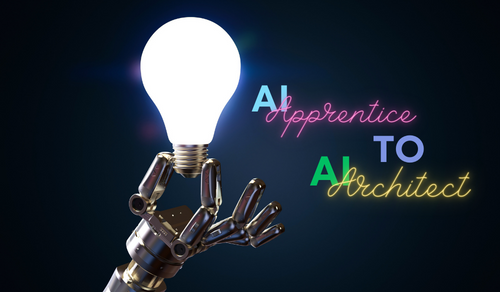Description
The popularity of Artificial Intelligence (AI) is growing at a very fast pace. Industries are implementing AI as it can replicate human actions but do it faster and more accurately. This training will teach you the skills required to go from an AI Apprentice to AI Architect.
Package Includes:
– Access to the e-learning modules for 12 months
– Online Mentor
– Final Exam assessment
– Practice Labs
Inhoud:
1. AI Apprentice
In this track of the AI Apprentice to AI Architect journey, the focus is on AI development and theory, HCI principles and methods, AI development with Python, computer vision for AI and cognitive modelling.
E-learning courses
– Artificial Intelligence: Basic AI Theory
– Artificial Intelligence: Types of Artificial Intelligence
– Artificial Intelligence: Human-computer Interaction Overview
– Artificial Intelligence: Human-computer Interaction Methodologies
– Python AI Development: Introduction
– Python AI Development: Practice
– Computer Vision: Introduction
– Computer Vision: AI & Computer Vision
– Cognitive Models: Overview of Cognitive Models
– Cognitive Models: Approaches to Cognitive Learning
Practice Labs: AI Apprentice (8 uur)
Perform AI Apprentice tasks such as exploratory data analysis, machine learning regression and classification, and multi-layered perception classification. Then, test your skills by answering assessment questions after performing deep neural network and convolutional neural network classification, as well as performing fully convolutional neural network boundary detection and NLP neural network text analysis. This lab provides access to tools used by AI Apprentices, including: Jupyter Notebook, Python, Anaconda, Scikit-learn, Keras.
2. AI Developer
In this track of the AI Apprentice to AI Architect journey, the focus is on Microsoft Cognitive Toolkit (CNTK), working with Keras, Apache Spark, Amazon Machine Learning, robotics, and Google BERT.
E-learning courses
-AI Framework Overview: AI Developer Role
– AI Framework Overview: Development Frameworks
– Working with Microsoft Cognitive Toolkit (CNTK)
– Deep Learning Packages: Keras – a Neural Network Framework
– Introducing Apache Spark for AI Development
– Implementing AI with Amazon ML
– Implementing AI Using Cognitive Modeling
– Applying AI to Robotics
– Working with Google BERT: Elements of BERT
Practice Labs: AI Developer (7 uur)
Perform AI Developer tasks such as implementing prediction models and using the CNTL framework, as well as performing sentiment analysis and image classification. Then, test your skills by answering assessment questions after performing category classification using BERT and prediction analysis using pySpark. This lab provides access to AI tools, including: Jupyter Notebook – Python – Anaconda – Scikit-learn – Keras.
3. AI Practitioner
In this track of the AI Apprentice to AI Architect journey, the focus is on advanced CNTK, Keras, Apache Spark, Amazon Machine Learning and building intelligent information systems.
E-learning collections
– The AI Practitioner: Role & Responsibilities
– The AI Practitioner: Optimizing AI Solutions
– The AI Practitioner: Tuning AI Solutions
– Advanced Functionality of Microsoft Cognitive Toolkit (CNTK)
– Working with the Keras Framework
– Using Apache Spark for AI Development
– Extending Amazon Machine Learning
– Using Intelligent Information Systems in AI
– AI Practitioner: BERT Best Practices & Design Considerations
– AI Practitioner: Practical BERT Examples
Practice Labs: AI Practitioner (8 uur)
Perform AI Practitioner tasks such as performing gradient descent and stochastic descent, as well as baysean optimization. Then, test your skills by answering assessment questions after normalizing Tensor using Keras, training and evaluating Keras model, and extending Spark and the Markov Decision Process. This lab provides access to tools typically used by AI Practitioners, including: – Jupyter Notebook – Python – Anaconda – Scikitlearn – Keras.
4. AI Architect
In this track of the AI Apprentice to AI Architect journey, the focus is on AI enterprise planning, reusable AI architecture patterns, current and future AI technologies and frameworks and XAI.
E-learning collections
– Elements of an Artificial Intelligence Architect
– AI Enterprise Planning
– AI in Industry
– Leveraging Reusable AI Architecture Patterns
– Evaluating Current and Future AI Technologies and Frameworks
– Explainable AI
Practice Labs: AI Architect (8 uur)
Explore topics and scenarios typically encountered by AI Architects such as working with an AI Steward Board, implementing an AI analytics dashboard, and identifying similarities and differences in AI applications implemented across difference industries. You will also be tasked with identifying the best platform given a scenario, comparing, and contrasting Parameter-Sharing and Federated Learning AI architectures, and applying AI explain ability methods. This lab provides access to tools typically used by AI Architects, including: – Jupyter Notebook – Anaconda
Datum:
U kunt ten alle tijden beginnen! Neem hiervoor contact op met een van onze opleidingsadviseurs.
Locaties: Zelfstudie
Leermethodiek: E-Learning
Duur: +/- 59 uur
Taal: Engels
Deze training is ook beschikbaar als:
– Klassikaal
– Maatwerktraining, neem hiervoor contact op met een van onze opleidingsadviseurs.
Voor veelgestelde vragen tijdens het bestelproces, bekijk onze F.A.Q. pagina.









